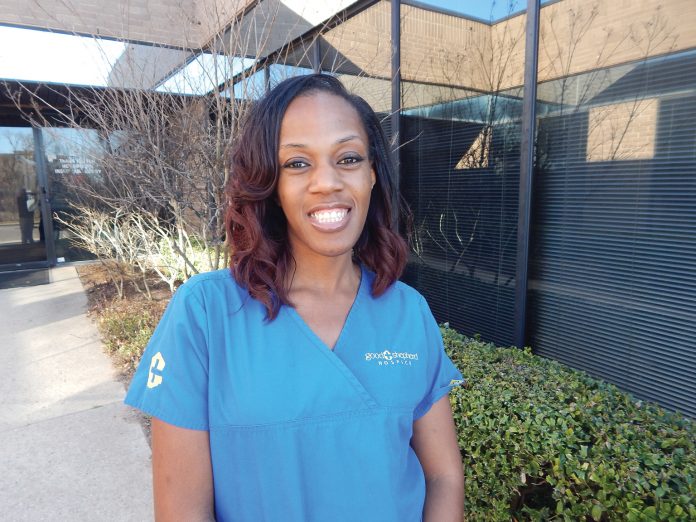
CAREERS IN NURSING
TO BE A HOSPICE NURSE: GOOD SHEPHERD HOSPICE PULLS TOGETHER
by James Coburn – Writer/Photographer
Kelly Milton dedicated her career to hospice care nearly eight years ago. She serves as the on-call registered nurse for the weekends at Good Shepherd Hospice with offices in Oklahoma City.
“I absolutely love hospice, but when I first came out of school hospice was not my choice,” Milton said. “And the supervisors that I worked for said, ‘You seem like you could be a hospice nurse.’ I said, ‘Oh no, not me, I’m supposed to heal.’ And she said, ‘No, you have that compassion. And you just know a hospice nurse when you see one.’”
Milton has been in hospice ever since. The graduate of Rose State College in Midwest City earned her RN degree in 2016.
“It was really good for me,” said Milton, who graduated from the Bridge Program at Rose State because she was already a licensed practical nurse for six years. She had also been a CNA for three years before earning her LPN credential.
Milton’s mother, Sharon Milton, a home health RN, inspired her to become a nurse when Kelly was in the second or third grade, Milton said.
“She used to go to nursing homes and she would take me and my sister with her. My sister was like, ‘No, I can’t do this.’ And I absolutely loved it.
She didn’t know the type of nursing she would do. But her desire to be a nurse was nurtured many years ago. Her mother taught her that nursing is more than a job. It’s not an area where one simply punches a time clock.
“You’re either a nurse or you’re not,” Milton said. “It cannot be just for a paycheck because you have someone’s life at your side. So if it’s not something you generally don’t want to do, you won’t survive in nursing.”
Her career improves the value of life, both that of families and patients as well as her own life. Every experience is a little different, she said.
“I feel like I take something from every experience. And it just gives me the opportunity to be there to hold someone’s hand that doesn’t have someone to hold their hand,” Milton said. “I also take it home with myself. I have three girls and it gives me the opportunity to not take life for granted, and to hug my family a little tighter.”
“It just put things in a different perspective, but at the same time it’s a circle of life and I get to be there to make sure it goes with dignity and compassion.”
She commends the patients and their families for their enduring strength. At times she experiences moments when she does not expect any more strength. But patients are very strong in their faith and will, she said.
“They just blow me away every day – how they take this journey on. They face it and they’re just very strong with their families by their sides,” Milton explained.
The circle of care at Good Shepherd provides comfort for family members, too. There is a chaplain, social worker, volunteers, nurse aides and nurses who create a synergy of care. Different families need certain things. After the beloved hospice patient transitions beyond this life, Good Shepherd remains in contact with family members.
“They can still call our chaplain and social workers and our on-call. It’s like a year to two-year process where we help them grieve,” Milton said. “We have counselors. We do the veterans ceremonies. We become part of the families. They lean on us and we lean on them.”
Being a hospice nurse can become stressful at times. So they must be able to take each day, one day at a time, Milton said. But everybody works as a team. Nurses pull together.
“Every day is a new day. And if you are one that have outside stressors that come into the job, you have to be able to leave those on the door step because with each family, you’re there for their family. You’re there to care for their needs.”
“You just cannot bring your own personal issues into that situation.”
Nursing school teaches you how to fix ailments. Going from nursing school directly into hospice means changing that mindset, Milton said. Hospice does not fix a disease process, but provides comfort.
“When I went to RN school, they tried to lean more into the end of life, whereas at LPN school, we really didn’t do a lot of end of life.”












